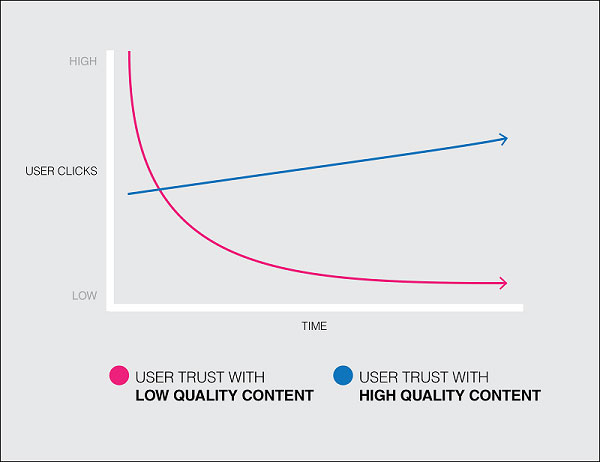 Content marketing tech company Outbrain has decided to make a change in its algos and how it delivers content links to publishers. In a move similar to what you might see with Google’s search product and its intriguingly-named “Panda” update, which sought to improve search results, Outbrain says it isn’t going to let just any advertiser broadcast its content through Outbrain’s publisher network.
Content marketing tech company Outbrain has decided to make a change in its algos and how it delivers content links to publishers. In a move similar to what you might see with Google’s search product and its intriguingly-named “Panda” update, which sought to improve search results, Outbrain says it isn’t going to let just any advertiser broadcast its content through Outbrain’s publisher network.
Outbrain CEO Yaron Galai tells Ad Age’s Jason Del Rey that the revenue hit to Outbrain will be up to 25% overall in the near term with hopes of boosting revenue in the long run. More on the Outbrain blog.
AdExchanger reached out to Galai about the algo update.
AdExchanger: When did you realize that an upgrade to Outbrain editorial guidelines (see them) was necessary? Any anecdotal tipping point you can share?
YARON GALAI: We’ve always had pretty strict guidelines as to which links we accept and which we don’t. As we’re pioneering the space of content recommendations – this is a constant exploration for us on what is right and what’s not. Historically, we’ve stuck with a couple of basic principals for links we accepted into Outbrain: 1) if it’s genuine, traditional ad-supported publisher content – we love it; 2) if it’s content that a marketer was involved in any way or form in producing – that’s fine, but it has to be made absolutely clear to the reader/viewer that the marketer was involved. (for example – Red Bull.)
The trouble started when we realized that a growing number of ‘publishers’ on the web are building content to look like group 1, while in reality they are a facade for group 2. We had a growing number of small indications that something was not right about this, but it proved extremely difficult to put our finger on what was going on. The specific tipping point was that one of these marketers, possibly absent-mindedly, explained to the Outbrain account manager what they were up to. The decision for me from there was pretty quick and straightforward.
Most ad and content networks succeed by milking advertisers for the highest $$’s possible. At Outbrain we try to be contrarian – we think we’ll win by building the best user trust in our links, and have them engage more with them. If you make content that looks like group 1 (genuine publisher content), but are actually part of group 2 (marketer driven) – that is deceiving and will erode people’s trust in Outbrain, in the publishers using our service, and ultimately in the whole format of content recommendations.
What does the “gaming” that you saw say about the state of content marketing today?
Ugh – unfortunately, I think we’re going to be pretty lonely on this journey. There is too much easy money to be made from rogue marketers, and I think plenty of companies are going to welcome those $$’s with open arms. If you are playing a short-term game, why not? My hope is that users become smarter about discerning between units that are really ads, and between those that are providing useful, interesting links to content. I hope that Outbrain can also help the better publishers realize the long term importance of keeping the editorial integrity of links they place on the ads, because that trust will serve them well for years to come. Once that trust is eroded, it can hardly ever be earned back (ask all those ad networks that now deal with complete banner blindness, for example…).
Thankfully, we’re seeing that many of the smarter publishers get this, and they are willing to forfeit some short-term RPM’s in order to retain their audience and keep serving them well for the longer-term. I have high confidence that the world of content marketing will work itself out in the long run, I just hope that rogue players that jumped in to milk this business quickly don’t erode the fundamentals of the market first.
With this change, what do you expect will be the financial and/or traffic impact to Outbrain publishers? Advertisers?
The buyers we have terminated made up about 15-20% of our revenue base (and up to 25% at some periods), and so that is going down to $0 as of this morning. It’s hard to predict what the long term impact will be, because we are a marketplace and some of the budgets will be replaced by others etc. Our publisher deals are all a simple revenue-share, so whatever revenue hit we take, our partners will take as well.
For our buyers – those terminated are obviously not thrilled, but we’ve given them a heads up and enough time to work out alternatives. For those not terminated, they can now get more people interested in their content, and at a lower cost. So they must be pretty happy I assume.
How will Outbrain make up for lost revenue for its publishers, let alone itself?
I don’t know! It remains to be seen if/how revenues will rebound for us. For me the most important thing is that we at Outbrain have a strong conviction that this is the right thing to do for the users, and therefore it had to be done. We’re very passionate about our own service, and it’s difficult to be passionate about deceptive links, once you understand that they are such. When we made this decision, we hadn’t done any comprehensive work as to how we might make up the lost revenue… we made it because we feel its the right thing to do. I believe that if we keep sticking to our principals and standing for interesting, trust-worthy links – then things like revenues will eventually sort themselves out. But we’ll see… 🙂
As for publishers – I think this is the right thing for their audiences, and so I hope they stick with us and are patient in this process. If their audience is a little more trusting in their sites, and a little more likely to come back and engage with their content – I think they’ll have good ROI that might be difficult to measure in specific $’s.
 From The Outbrain blog
From The Outbrain blog
on the new update.












